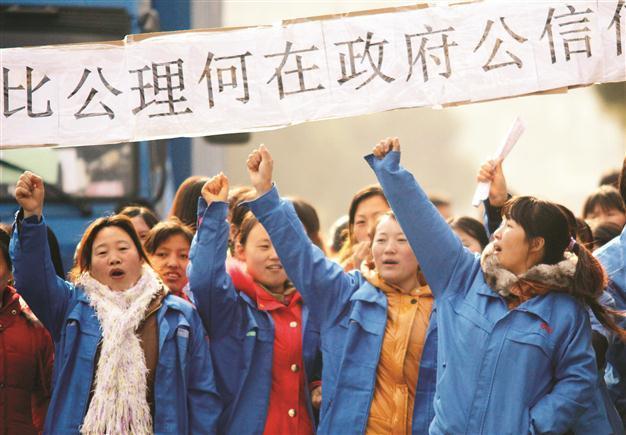China increases wages amid social unrest fears
SHANGHAI - Agence France-Presse

Workers on strike blocking the entrance gate of Hi-P International factory yell slogans during a protest in Shanghai Dec 2. Labor actions in the country are increasing. REUTERS photo
China is raising minimum wages in some key cities and provinces as local officials try to combat labor shortages and growing worker unrest.The southern city of Shenzhen, a major manufacturing center on the border with Hong Kong, will raise its minimum wage by nearly 14 percent to 1,500 yuan ($238) from February, according to a statement.
Authorities in the capital Beijing raised wages by almost 9 percent to 1,260 yuan from Jan. 1, while the southwest province of Sichuan also hiked wages by at least 23 percent, the official Xinhua news agency said.
Big shift in labor market
“The government policy is based upon changes in the market,” said Stephen Green, head of Greater China research at Standard Chartered Bank in Hong Kong. “China’s labor market has witnessed a huge change in the past three to five years. Lack of labor is quite common now.”
Shenzhen already has the highest minimum wage in the country, but manufacturing hubs typically face labor shortages after the Chinese Lunar New Year since many workers do not return after going home for the holiday.
Zeng Xiangjin, who manages a textile firm in Shenzhen, said he typically loses up to 30 percent of his workers after the holiday, which falls in January this year, and he will need to raise salaries to retain others.
“The workers leave for a variety of reasons, including better salaries in other cities. This year, I will definitely need to raise salaries another ten percent or even more,” Zeng told Agence France-Presse on Thursday.
The moves follow a series of strikes across China since November, as workers protest low salaries, wage cuts and poor conditions amid company cutbacks due to the global economic slowdown.
Persistently high inflation - which peaked at a three-year-high of 6.5 percent in July last year but has since retreated - has also cut into people’s spending power.
In the latest strike, some 2,000 steel workers in Sichuan’s provincial capital of Chengdu walked off the job Wednesday to protest low salaries, according to the U.S.-based rights group China Labor Watch.
Chinese trade surplus narrows
SHANGHAI - Agence France-Presse
China’s trade surplus narrowed to about $160 billion last year, Commerce Minister Chen Deming said yesterday, amid weaker demand from key export markets like the United States and Europe.
Total trade volume - imports and exports combined - rose more 20 percent to $3.6 trillion in 2011, the official Xinhua news agency quoted him as saying. Xinhua gave no breakdown for exports and imports.
The latest figures, down from a trade surplus of $183 billion in 2010, came as key Western markets struggle to emerge from the global economic downturn.
Chinese leaders have pledged to boost domestic demand to counter slowing exports, a key driver of economic growth.
Still, China’s commerce ministry said Wednesday that foreign trade was forecast to grow at an annual rate of 10 percent to reach $4.8 trillion by 2015, as it issued development goals for the next four year.
















